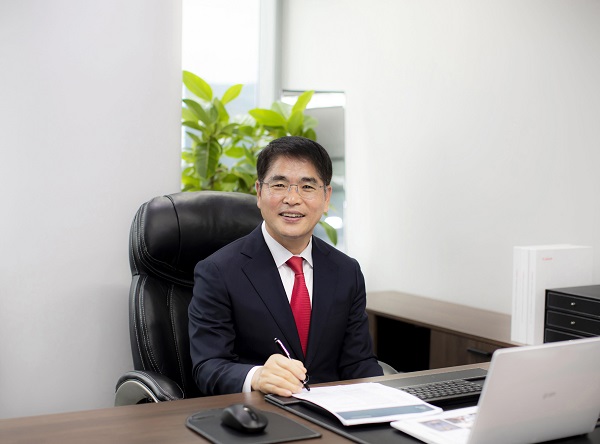“It is true Canon Medical Systems is a latecomer in the local medical imaging market. But the market situation will change. You will see Canon Medical taking the No. 1 position in computed tomography (CT).”
Kim Young-joon, who took office as the CEO of Canon Medical Systems Korea in January, made this and other remarks at a meeting with reporters covering medical devices news on Wednesday. Kim stressed that he was confident that Canon Medical products’ high quality, excellent durability, and new technologies would overturn the medical imaging industry.
Kim previously served as vice president of Philips Korea, spending 35 years there with his experiences covering all medical device-related fields, including customer management, logistics purchasing, and sales and marketing. He is known as one of the most recognized medical imaging device experts in Korea.
He said Canon Medical would beat the three largest companies in the market – GE, Philips, and Siemens – and explained why he thought so.

Question: What is your strategy to compete with leading firms such as GE, Philips, and Siemens in the traditional four major imaging sectors (CT, X-ray, MRI, and ultrasound)?
Answer: A success in the competition will hinge on technology and durability. Canon Medical is already one of the leaders in CT and ultrasound equipment, and we expect to top the industry soon.
Our CT equipped with “AiCE,” the world's first deep learning algorithm-based image reconstruction technology, enables high-resolution and low-radiation imaging. This is a competitive advantage because our technology applies not only to Aquilion Precision, the world's only Ultra-High Resolution (UHR) CT, and Aquilion ONE PRISM, Canon's best new product but also to mid-range CT. In ultrasonic equipment, our products have excellent resolution and transmittance but innovative “killer applications” such as Liver Package and Superb Microvascular Imaging (SMI), which are actively used in diagnosis and research.
The MRI and angiography sectors have a high market entry barrier, making it difficult for us to showcase our products. However, our global headquarters are continuing to invest in the R&D of these sectors. So, we will see good outcomes soon. Our company was the world’s first to apply the AI-based noise reduction technology to an MRI device. So, I believe we are sufficiently competitive in terms of technology leadership. We are also investing in angiography to improve imaging quality further. We plan to launch a high-end product at the end of this year or early next year.
Q: In the domestic medical device industry, Canon Medical is less known than GE, Philips, and Siemens. Do you have a particular strategy to overcome this issue?
A: You’re right. We are indeed less known than Philips is. But it doesn’t mean our product’s quality is not good. I think promotion and marketing activities are important and plan to invest in them aggressively. We are also working with physicians for more research and plan to expand support for research.
Q: Can you further explain the new technologies of Canon Medical’s products used for research?
A: Canon has a technology called Advanced Intelligent Clear-IQ Engine (AiCE), an AI-based image quality improvement technology. Our super-ultra-resolution CT, Aquilion Precision, significantly improved the spatial resolution of the existing top-notch CT. It allows us to discern an anatomical structure up to 0.15 mm. The equipment has already won approval in the U.S., Europe, and Japan. Canon Medical Systems Korea also plans to seek the green light from the Ministry of Food and Drug Safety.
Q: The medical imaging market has contracted due to Covid-19. What are your plans for marketing and public relations to overcome the challenge?
A: In times like this, it is essential to carefully examine what kind of situation the client is facing and what the needs are, and then respond accordingly. We’re preparing sales and marketing through webinars or video conferencing. We plan to provide customized financial solutions. Also, we will take this situation, where external activities are challenging, as an opportunity to enhance our employees’ competency. We are concentrating on reinforcing individual competitiveness through training of salespersons, product and clinical experts, and engineers.
Q: Covid-19 will bring changes in the healthcare sector. Do you have an exclusive product to help fight infectious diseases?
A: With the spread of respiratory infectious diseases worldwide, the need for mobile CT scanners or mobile X-rays is emerging. Canon Medical’s headquarters is also preparing a mobile CT solution. A conventional mobile CT scanner is mobile-only, without a table, so the shooting range is minimal. But Canon’s product can be installed on a vibration-free vehicle. It can help control the movement of infected patients while ensuring long-distance mobility and purposes of a general CT scanner.
Q: Soured relations between Korea and Japan also affect the healthcare industry. Although its impact on the medical device industry might not be significant, it cannot be ignored. The political relationship between the two countries could affect Canon’s business in Korea. Do you have any plans on this issue?
A: As a businessman, I should be careful about mentioning political issues. I think it is right to do our business depending on market situations. Also, I want to take a step further to inform Korea and Japan of each country’s high medical technologies.
Q: Do you have any comments for Korean physicians?
A: I think healthcare is Korea's new growth engine. Korean healthcare professionals and medical technologies are already the world’s best. If there are various policy considerations and support, healthcare will make a significant contribution to national growth. Canon Medical is sure that Korea will help lead the healthcare sector.
With the acquisition of Toshiba Medical, Canon Medical is investing heavily in the growth of the medical device business. Canon group's three original technologies – optical, image processing, and sensor -- are all closely related to the healthcare business. If these technologies are combined with 100-year-old technology in medical imaging, Canon Medical’s growth potential is limitless.

